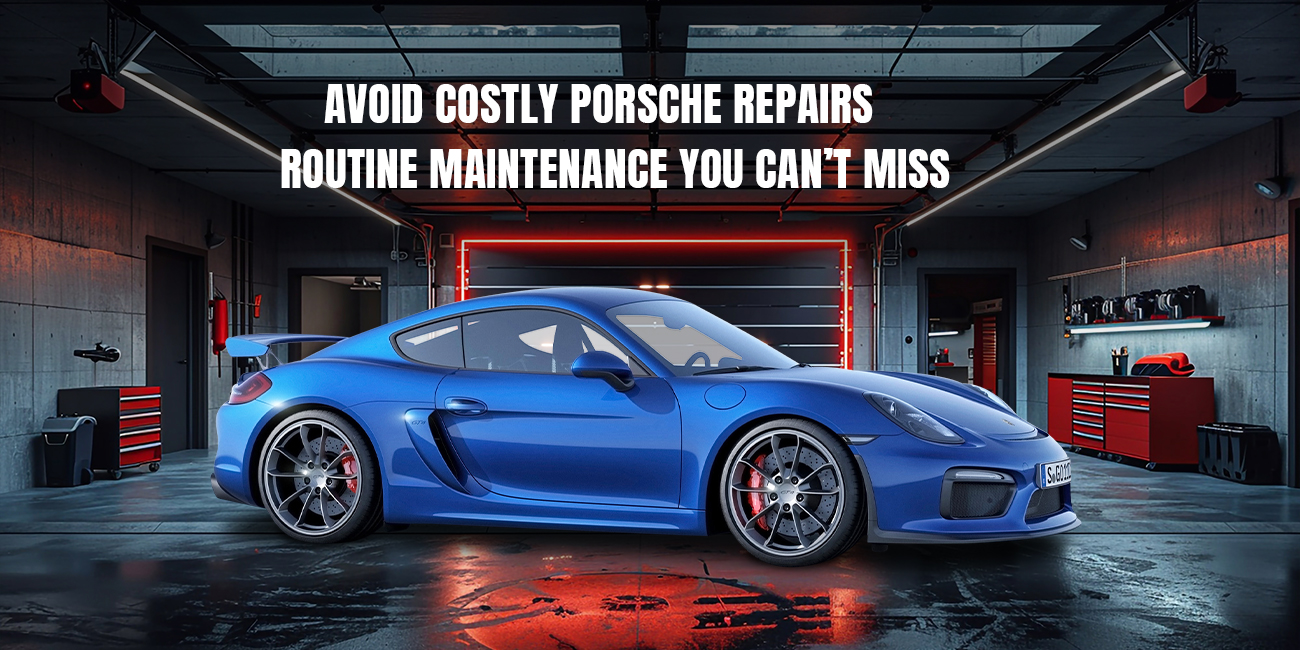Regular maintenance would cover things like: the proper oil change (yes, use the right type of synthetic oil that meets Porsche Oil Standard), flushing brake fluid, performing a spark plug check and an air filter/cabin filter inspection—or replacement if needed—cooling system checkup (engine coolant checking/fill level condition, water pump function check, cooling fan function/symptoms diagnosis test & radiator), tyre inspection/alignment evaluation by suspension rubber ball joint but don't forget tire pressure/smoothness investigation too, suspenioner-clearencer-checks--we're talking about clearances in the action of your vehicle—get a battery/diagnostic test up to snuff and watch for "acts," as well as sticking to official maintenance schedules (e.g., every ~10kmi or year-ish ).
Frequently Asked Questions
Explore our FAQs below or find the answers you're looking for right here.
-
What routine maintenance is essential to avoid costly Porsche repairs?
-
Which maintenance tasks can prevent major Porsche repair expenses?
Non-major expense tasks include timely engine oil changes, a transmission service (especially PDK dual‑clutch transmission models), replacement of spark plugs and filters at recommended intervals, brake fluid flushes when required, checking for coolant leaks, following the cooling system (water pump and radiator) inspection parameters, exhaust system and fuel line inspections for wear or leaks, keeping tyres and suspension in good alignment condition and carrying out diagnostics using Porsche-specific equipment. Scheduled pre‑purchase inspections and compliance with the servicing regime should also be considered here.
-
What are the common causes of expensive repairs on Porsche cars?
The most frequent causes include missed oil changes leading to engines that wear out or are destroyed by leaks, missing transmission services causing clutches and wet-clutches to burn up and cooling system neglect causing overheating - not to mention brake or suspension/alignment issues from rotors warping to tyres being damaged or chassis twisted due to neglected parts, plus electrical/diagnostic neglect that leads to misdiagnosing faults and compounding long-term problems. Problems such as IMS bearing failure and timing chain idler problems can occur, particularly in earlier flat‑six engines, if maintenance is neglected.
-
What are the signs that my Porsche needs maintenance?
Things to look out for are oil upper levels darkening or low between services, any unusual engine noises (knocks of misfires), warning lights on the dash board, harsh shifting in either PDK model or delayed/racing shifts in a manual, an extension period brake pedal feel/spongy/grinding noise whilst using specials equipment), uneven tyre wear which is pulling up said (alignment/suspenion issues) battery/electrical gremlins, coolant appearing low once it has cooled down an losing sight of where from or codes that appear through PIWIS or specialist system.
-
How often should I perform routine maintenance on my Porsche?
But as a general rule of thumb: Every year or 10,000 miles for simple stuff (oil change and inspection), every 20K/2 years for more complicated stuff (brake fluid, belts/filters), and 30-40K for things like spark plugs, transmission fluid changes, and full inspections. Real intervals, inevitably, will vary based on driving habits, climate, and model year.
-
How do climate or driving habits affect the maintenance schedule of a Porsche?
Severe conditions (extreme heat or cold, salty roads, frequent short trips) and aggressive driving (track days, high‑RPM use) place even greater stress on the individual components in a car. For instance, oil breaks down sooner, brake fluid attracts water faster, tyres wear out quicker, cooling systems are more heavily taxed and electrical systems get a greater workout in harsh conditions. Under these conditions, you must shorten the maintenance intervals (i.e., more frequent oil changes, brake inspections). Always refer to your owner’s manual and properly adjust your maintenance accordingly.
-
What costs are typically involved in Porsche repairs without maintenance?
If you skip routine maintenance, expenses can run high in a hurry. What starts off as a missed oil change can result in blown engine seals or all-out engine rebuilds. A lack of servicing to a transmission can lead to PDK gearbox replacement, several thousand pounds’. Issues caused by brake and suspension neglect can require rotor replacements, caliper replacemenst and alignment/suspension rebuilds. Head gasket replacement or even engine replacement can be the result of a cooling system failure. From a financial perspective, you’re going to be looking at maintenance costs in the low hundreds or low thousands per year for regular maintenance, and tens of thousands for major repairs — this is exactly the “costly Porsche repairs” that you want to minimize.
-
What are the best practices for changing Porsche engine oil to prevent engine damage?
Best practices include: use high‑quality synthetic oil that meets Porsche Oil Standard, replace the oil filter at the same time, change oil at or before prescribed interval (commonly ~10,000 miles or 1 year for many Porsche models) ensure the car has reached operating temperature before shutting down (so contaminants get suspended properly); check for oil leaks (oil‑cooler gasket, etc); maintain proper oil level between changes; use genuine filters and seals; keep records of the service; adapt interval if you drive aggressively, short trips, or in hot/cold climate. These steps help preserve engine tolerances, reduce wear, and help avoid oil‑related failures.
-
How can I troubleshoot brake system issues before they become costly in a Porsche?
Start with routine inspections: check brake pad thickness, disc condition (warping, colour changes), brake fluid clarity and level, brake lines for any signs of wear or leaks. Listen for unusual noises (squeal, grinding) when braking, feel for spongy or soft brake pedal, check for uneven braking pull, monitor brake fluid age (flush if older than 2 years or ~20k miles for many Porsche models). If you notice any of these signs, schedule a brake inspection immediately at a specialist service centre that knows Porsche systems. Early detection prevents rotor replacement, caliper damage, or full brake‑system failure — all of which escalate repair costs.

